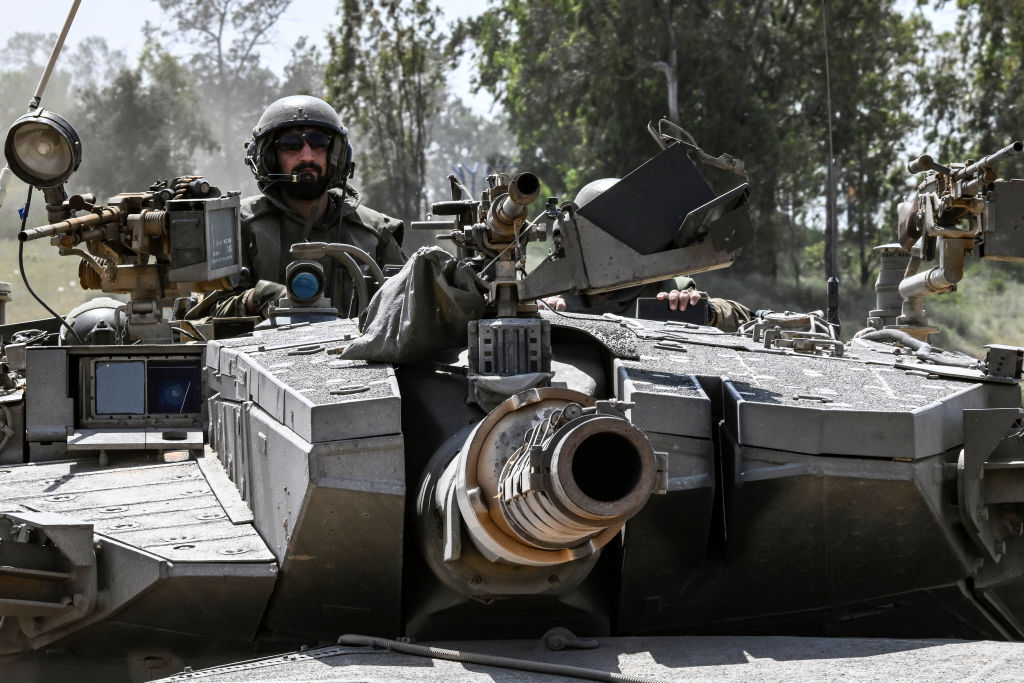TEL AVIV, Israel—Early Sunday morning, Israel withdrew most of its remaining ground troops from the Gaza Strip, leaving behind just one brigade to secure the corridor dividing the enclave’s north and south. Israeli officials say the operation in Gaza is far from over, but Israel may soon be faced with another, potentially more lethal war against Iran and its proxies.
Israelis across the country began stockpiling water, nonperishable food, spare batteries, and transistor radios this week amid renewed threats by Iran to respond to the strike on its military personnel in Damascus, Syria, on April 1. The attack—for which the U.S., Iran, and Syria have said Israel was responsible—killed several top Islamic Revolutionary Guard Corps (IRGC) members, including Mohammad Reza Zahedi, a key figure in fueling Hezbollah’s ongoing attacks on Israel from Lebanon.
“The defeat of the Zionist regime in Gaza will continue and this regime will be close to decline and dissolution,” Iranian Supreme Leader Ayatollah Ali Khamenei said in a speech last week. “Desperate efforts like the one they committed in Syria will not save them from defeat. Of course, they will also be slapped for that action.”
That “slap” looks imminent, U.S. and Israeli intelligence agencies have reportedly assessed. But where it will come from—and what form it might take—remains unclear. Tehran typically uses its network of well-armed proxy groups to launch attacks without provoking a direct response from their victims, but this time may be different.
The Israeli attack in Damascus targeted what Iran publicly declared to be a consular site. Though Israeli officials claimed the strike targeted a military facility used by the IRGC—a U.S.-designated terrorist group—the Islamic Republic’s allegation that Israel targeted a diplomatic mission, considered Iranian territory, may trigger a more direct response, which Israel has privately and publicly cautioned against. “If Iran attacks from its territory, Israel will react and attack in Iran,” Israeli Foreign Minister Israel Katz tweeted Wednesday, tagging Khamenei in the post.
President Joe Biden likewise warned Tehran to avoid escalation or risk U.S. involvement.
“Our commitment to Israel’s security against these threats from Iran and its proxies is ironclad. Let me say it again: ironclad,” Biden said during a press conference on Wednesday. “We’re going to do all we can to protect Israel’s security.” Gen. Erik Kurilla, commander of the U.S. Central Command, arrived in Israel Thursday to help coordinate the country’s defense against the threat of an air barrage from Iran or one of its proxies.
Israel has already begun taking its own steps to thwart such an attack, which could include the coordinated use of drones, ballistic missiles, and cruise missiles. Last week, the Israel Defense Forces (IDF) called up air defense reserves soldiers and canceled leave for troops in combat units. Residents of central Israel woke up last Thursday to find their phones’ GPS apps telling them they were actually in Beirut, Lebanon, as the IDF disrupted GPS signals to prevent drones and cruise missiles from reaching their targets. The military had already undertaken the measures in northern Israel, including the country’s third-largest city of Haifa, for months amid the omnipresent threat of large-scale bombardment by Hezbollah.
The Iranian-backed terrorist group in Lebanon currently boasts an arsenal of some 150,000 rockets and long-range missiles capable of striking deep into Israeli territory. It has already launched cross-border attacks on military and civilian targets in northern Israel on a near-daily basis since October 7, forcing tens of thousands of residents from their homes with no end date in sight. But recent days have brought renewed fears of an all-out war with Hezbollah, Iran’s largest and most powerful proxy, which could result in major damage to Israeli critical infrastructure and civilian centers countrywide.
On Sunday, Haifa Mayor Yona Yahav urged residents of the city to install a landline telephone in their bomb shelters and take other precautions, adding that he “[doesn’t] sleep at night” because of the security situation. The IDF, however, hasn’t changed its guidance on what supplies civilians should have on-hand for emergencies, Maj. Nir Dinar, a military spokesman, told The Dispatch. He added that a recommendation that public shelters be prepared for aerial attacks has been in place since the beginning of the war.
But as it urges civilians to remain calm, the military has begun to prepare for an escalation in the north. IDF Northern Command announced last week that it had finished preparations to shift from defensive to offensive operations, including by stocking warehouses to “enable the immediate mobilization of reserve forces.” On Monday, the Israeli navy and air force conducted joint exercises in the northwest, near Haifa, in preparation for the possibility of an attack from Lebanon.
Israel has also increasingly gone on the attack. An Israeli strike in the southern Lebanese village of As-Sultaniyah on Monday killed a commander in Hezbollah’s Radwan Forces—an elite unit trained to infiltrate Israeli territory—and targeted attacks on the group’s military depots, command centers, and launch sites continue. Israel likely also sought to disrupt Hezbollah’s operations through the assassination of Zahedi in Damascus. The slain IRGC commander, serving as Iran’s key liaison to Hezbollah, led efforts to funnel weapons to the proxy group by way of Syria.
Zahedi also fostered a close relationship with Hezbollah’s leader, Hassan Nasrallah, who on Sunday vowed that Iran would avenge Zahedi’s death. The Damascus attack marked a “turning point,” Nasrallah said in a speech. “Be certain, be sure, that the Iranian response to the targeting of the consulate in Damascus is definitely coming against Israel.” The Hezbollah leader went on to condemn the United States, which he deemed “responsible for the crimes and wars in the region.”
And indeed, American officials fear Iran’s threats of escalation could result in the targeting of U.S. forces in the region after a period of relative calm. A series of attacks by Iranian-backed militias on American troops abated in February, after the U.S. launched airstrikes against the groups in retaliation for the killing of three soldiers in Jordan. Biden administration officials have tried to distance themselves from the Damascus attack in an apparent effort to prevent a repeat incident.
“I don’t have anything more to say about the strike in Damascus, except that we weren’t involved in any way whatsoever,” National Security Council spokesman John Kirby told reporters Monday. “And I need to just leave it at that.” State Department spokesman Matthew Miller likewise said Monday that the U.S. “made clear that we don’t want to see Israel escalate this conflict in any way.”
The administration’s push for Israel to show restraint in the face of Iranian aggression, together with its recent critiques of the country’s conduct in its war against Hamas, has some Israelis feeling more alone than ever. Biden on Tuesday said Israel should “just call for a ceasefire” for six to eight weeks, without mentioning the hostages still held by the terror group. Critics argued the remarks undermined Israel’s hand in ongoing negotiations to free the captives in exchange for a ceasefire, and indeed, Hamas has largely rejected the latest U.S.-backed proposal in the days since.
But Israel’s isolation may be greater in appearance than in substance. The U.S., for instance, hasn’t outright opposed the eventual continuation of the war in Gaza, saying the IDF’s partial withdrawal would allow soldiers to “rest and refit.”
“I think there is still consensus on the need to defeat and depose Hamas,” Assaf Orion, a brigadier general in the IDF reserves and defense strategist at the Tel Aviv-based Institute for National Security Studies and the Washington Institute for Near East Policy, told The Dispatch. This includes through “the degradation and dismantling of the remaining units, which are now in Rafah. … There’s less disagreement on the ends and more disagreement on the means,” he added, referring to the U.S. demand to see a credible plan to protect the Gazan civilians sheltering in the southernmost city.
On Iran’s threatened reprisal, too, Washington and Jerusalem may be more aligned than they appear at first glance. Biden’s stated “ironclad commitment” to Israel’s security and Gen. Kurilla’s arrival to Israel are likely intended to send a message to Tehran: A direct attack could incur a joint response. This scenario may be something the Islamic Republic is unwilling to risk, despite its continued grandstanding.
“If the Iranians choose to go against national infrastructure or Israel’s population,” Orion said, “it might take the conflict to the next level, which I don’t think they’re interested in.”







Please note that we at The Dispatch hold ourselves, our work, and our commenters to a higher standard than other places on the internet. We welcome comments that foster genuine debate or discussion—including comments critical of us or our work—but responses that include ad hominem attacks on fellow Dispatch members or are intended to stoke fear and anger may be moderated.
With your membership, you only have the ability to comment on The Morning Dispatch articles. Consider upgrading to join the conversation everywhere.